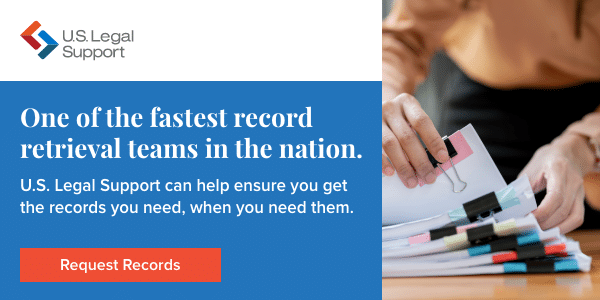How to Reduce Record Retrieval Costs

Record retrieval helps law firms get the documents they need to learn more about a client or situation, strategize effectively, and substantiate the arguments they make. However, the process can be costly, especially when working with sensitive, high-leverage documents like medical records. Security risks and a restrictive regulatory environment can create delays and other inefficiencies, which compound with other challenges to increase costs.
Any legal team can benefit from a swifter, more efficient, and more cost-effective process for record retrieval. Below, we’ll provide some context for why these processes are so expensive before explaining how law firms can minimize costs while maintaining quality.
The High Costs of Traditional Record Retrieval
Records retrieval can be complicated, and legal teams that rely on swift and complete access to high-quality documents can expect to pay a pretty penny for the service.
The main reason record retrieval is so expensive is that parties who control records can often charge exorbitant fees to provide copies of them. One example is in medical record retrieval, wherein hospitals and other providers do have some legitimate reasons to charge high prices for documents. Luckily, some states are implementing laws that limit the amounts these institutions can charge to provide records to their authorized viewers.1
Another major source of heightened record retrieval costs is inefficiency in the retrieval process. We’ll touch on this below in our guidance on removing bottlenecks, but the general idea is that mistakes can lead to delays and duplicated requests, which multiply costs quickly.
How to Reduce Costs Without Sacrificing Accuracy
Retrieving records efficiently requires communication channels and logistical infrastructure, along with dedicated efforts by legal professionals who are already typically stretched thin.
For these reasons, many firms look to external service providers as a cost-effective option.
In 2024, about half of all firms reported using external services at least some of the time, while over a quarter used them for most cases, and about 14% used vendors for every case that required record retrieval.2While using a quality vendor is a key way to keep costs down (see below), using a bevy of them in an unorganized way is suboptimal, as it has the potential to introduce inaccuracies and inconsistencies that undo the cost savings of outsourcing.
Three impactful ways to streamline record retrieval while maintaining quality are:
- Assessing and addressing inefficiencies in the request process
- Leveraging automation and other technologies for record retrieval
- Partnering with a single quality partner with a unified platform
Let’s take a closer look at each one.
Streamlining Requests to Minimize Duplicate Efforts
This is a holistic, programmatic solution. It can and should be implemented alongside the other two, but it prioritizes assessing current processes and making adjustments over implementing new products or services. Law firms should begin by monitoring their typical records retrieval process over an extended period of time to determine whether there are any consistent bottlenecks or delays. These are distinct from special cases or circumstances outside of the firm’s control, such as natural disasters or political turbulence.
In many cases, the biggest inefficiencies stem from requests. Requests can take too long to make officially, can be timed poorly, or can be inaccurate, going to the wrong parties.
When mistakes like these happen, requests need to be made twice or more.
This may be because of an excessive approval (or pre-approval process) or because a firm lacks logistical infrastructure. In any case, eliminating costly duplicates requires buy-in from leaders and individual professionals to change the entire way record requests are made.
Leveraging Automation for Faster Document Processing
Whether implemented alongside or in lieu of a complete program overhaul, automation for rote repetitive tasks is one of the best ways to increase bandwidth. AI tools can be used to automate all phases of document processing, starting with the requests.
Some particular ways that automation can be leveraged to this end are:
- Initial analysis and preparation for requests to streamline approval
- Determination of which specific files are needed and from where
- Communication of the request proper with follow-ups as needed
- Intake and assessment of forms received for fidelity and accuracy
- Categorization, sorting into secure hosting, and automatic notifications
- Threat monitoring, access control, and safe termination of documents
With the right configurations, a retrieval platform leveraging AI and machine learning (ML) can get documents to your legal team faster while also ensuring accuracy and security.
Partnering with a Single Reliable Records Retrieval Provider
As with efforts to streamline requests, this is a flexible and holistic solution. It also will likely entail leveraging automation for some or all of the records retrieval process, depending on the extent to which your chosen provider uses this technology. The benefits of finding the right records retrieval partner start with the fact that it can obviate many of the hard strategic decisions and preparation that go into a complete retrieval program overhaul.
However, the practical impacts can be the same—if not better. By working with a quality service provider, legal teams can avoid most or all of the stress that goes into planning for and executing a record request. This includes all of the analytical work, the communications loops, and much of the security compliance oversight that would need to be done in-house.
By partnering with an external record retrieval partner, law firms get all the benefits of an effective, efficient process without having to put in the logistical groundwork to build it.
How Legal Support Services Can Help Cut Costs
Partnering with a trusted legal services provider for records retrieval and/or other services helps law firms cut costs by reducing administrative burdens. End-to-end retrieval solutions that integrate seamlessly with other litigation support services in a unified platform take the guesswork and cross-system translation out of the equation. This frees up your best and brightest legal minds to devote more of their energy and attention to high-stakes strategy.
In short, legal support services like record retrieval enable better, more efficient operations.
Another benefit the best legal service providers offer is uniform coverage across a wide variety of practice specializations and locations. When working on a case that involves specific industry- or location-based conventions outside a firm’s normal scope, an outside partner allows lawyers to leverage service providers’ entire gamut of experience.
Ensuring Compliance while Maintaining Efficiency
On a related note, providers’ familiarity and experience with wide-ranging legal landscapes also facilitate seamless compliance with regulatory frameworks you may not be used to.
The best record retrieval partners will streamline compliance with all major frameworks:
- Industry-based regulations – Industries like healthcare have strict data security policies related to records law firms may need, so retrieval processes need to be compliant with them. For medical records, the Health Insurance Portability and Accountability Act (HIPAA) requires risk monitoring and specific safeguards for protected health information (PHI). So, your platform needs to be HIPAA-compliant.
- Location-based regulations – Similarly, legal records containing the personal data of individuals in protected areas often need to comply with governmentally-mandated privacy protections. One of the most noteworthy is the European Union’s General Data Protection Regulation (GDPR), which requires visibility and communication controls to uphold data subjects’ rights. A sound retrieval platform will have these.
With respect to cost-cutting, non-compliance penalties can include high up-front expenses and long-term impacts like sanctions and reputational damage. Ignore them at your own risk.
No matter what kinds of documents you need, what sensitive data they contain, or what rulesets apply to them, a quality record retrieval partner can help you access them swiftly and securely. Efficiency cannot come at the expense of non-compliance fines.
Optimizing Record Retrieval for Long-Term Savings
Beyond implementing the immediate cost-saving methods above, law firms can prepare for long-term success by crystalizing their principles into organization-wide approaches. Moving toward more efficient processes and minimizing duplicates can and should lead to a broader review of document management and overall operational efficiency. Automating certain parts of record retrieval can lead to automating other inefficient manual processes, with or without the use of a trusted litigation services provider. Consolidating external vendors into a streamlined service suite—especially one committed to service and security—is another advantage.
Aside from optimizing practices today, these kinds of changes help law firms prepare for the future of records retrieval. Forward-thinking firms are already adopting advanced technology such as AI and ML tools to get their documents faster and do more with them, efficiently.
Partnering with a provider like U.S. Legal Support can put you ahead of the curve.
Supercharge Your Record Retrieval with U.S. Legal Support
Record retrieval processes can be costly, especially when not approached strategically or with the right tools and infrastructure in place. Law firms looking to reduce these costs should consider program review, automation, and working with a quality litigation support service provider.
U.S. Legal Support provides fast, secure, and reliable record retrieval services to law firms all across the country. Our team leverages years of experience across various specializations, as well as communication and logistical infrastructure to deliver records cost-effectively.
To learn more about how we can help, get in touch today!
Sources:
- New Jersey Workers’ Comp Blog. New Law Lowers Cost of Obtaining Medical Records. https://njworkerscompblog.com/new-law-lowers-cost-of-obtaining-medical-records/
- JD Supra. Top Record Retrieval Trends in 2024. https://www.jdsupra.com/legalnews/top-record-retrieval-trends-in-2024-4112596/

Editoral Policy
Content published on the U.S. Legal Support blog is reviewed by professionals in the legal and litigation support services field to help ensure accurate information. The information provided in this blog is for informational purposes only and should not be construed as legal advice for attorneys or clients.


